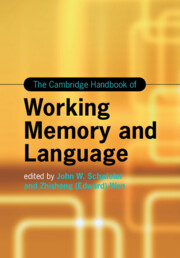Book contents
- The Cambridge Handbook of Working Memory and Language
- Cambridge Handbooks in Language and Linguistics
- The Cambridge Handbook of Working Memory and Language
- Copyright page
- Contents
- Figures
- Tables
- About the Editors
- About the Contributors
- Acknowledgments
- Overview of the Handbook
- Part I Introduction
- Part II Models and Measures
- Part III Linguistic Theories and Frameworks
- Part IV First Language Processing
- Part V Bilingual Acquisition and Processing
- Part VI Language Disorders, Interventions, and Instruction
- Part VII Conclusion
- 40 Toward an Integrated Account of Working Memory and Language
- Index
- References
40 - Toward an Integrated Account of Working Memory and Language
from Part VII - Conclusion
Published online by Cambridge University Press: 08 July 2022
- The Cambridge Handbook of Working Memory and Language
- Cambridge Handbooks in Language and Linguistics
- The Cambridge Handbook of Working Memory and Language
- Copyright page
- Contents
- Figures
- Tables
- About the Editors
- About the Contributors
- Acknowledgments
- Overview of the Handbook
- Part I Introduction
- Part II Models and Measures
- Part III Linguistic Theories and Frameworks
- Part IV First Language Processing
- Part V Bilingual Acquisition and Processing
- Part VI Language Disorders, Interventions, and Instruction
- Part VII Conclusion
- 40 Toward an Integrated Account of Working Memory and Language
- Index
- References
Summary
The last 50 years have witnessed an exponential growth and significant progress in working memory and language sciences research independently and jointly, though a generalizable theory or model that transcends disciplines is still absent from the literature. Drawing on multidisciplinary insights from cognitive science and emerging patterns from language sciences, we propose an integrated account of working memory as a viable taxonomy framework for linking its putative components and processes with aspects of language acquisition and processing domains and skills, bilingual development, and specific language impairments. We end the chapter by outlining further directions to reinforce the reintegration of working memory and language sciences as couched within the key tenets and basic principles of this integrative account.
Keywords
Information
- Type
- Chapter
- Information
- The Cambridge Handbook of Working Memory and Language , pp. 909 - 927Publisher: Cambridge University PressPrint publication year: 2022
References
Accessibility standard: Unknown
Why this information is here
This section outlines the accessibility features of this content - including support for screen readers, full keyboard navigation and high-contrast display options. This may not be relevant for you.Accessibility Information
- 2
- Cited by
